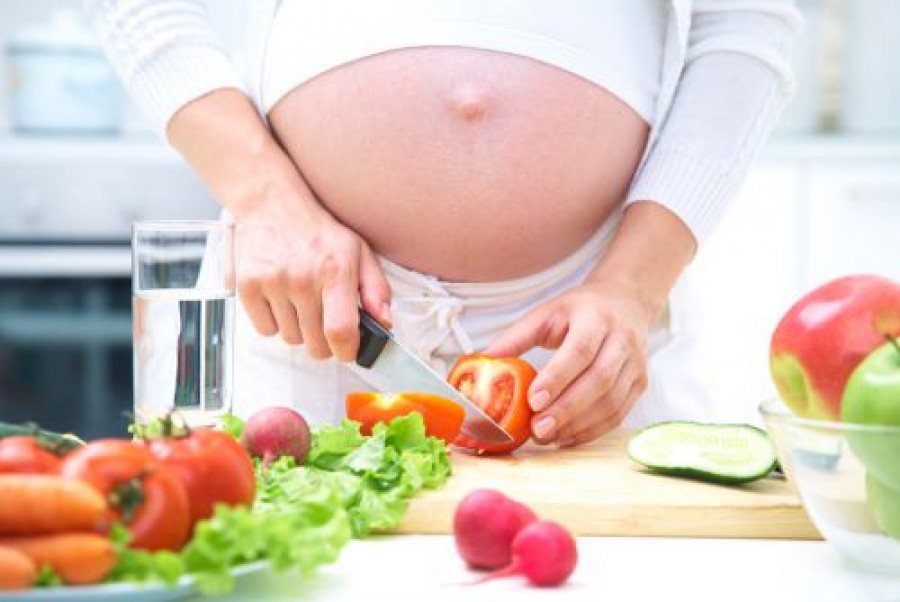Is dieting safe while pregnant?

Whether you were eager to lose weight prior to becoming pregnant, or have gained a few kilos now that you’re halfway through the pregnancy – you’re not alone. A majority of pregnant women are overweight or obese, either because of prior weight issues before or during pregnancy, and pre-existing medical conditions that can impact weight including hyperthyroidism. Many women have a goal to lose a certain amount of weight after giving birth, but following a healthy diet (not a strict and calorie restricting one) can actually be beneficial and reduce the risk of dangerous complications and further health conditions.
Can I diet while pregnant?
Although it’s recommended by doctors to eat a healthy and balanced diet, it’s more like a lifestyle choice that shouldn’t be restrictive. A lot of diets come with a number of rules and fasting methods that can be dangerous while pregnant, as they limit food intake that is needed for you and your developing baby. There are ways to lose weight during pregnancy without cutting calories and going on a typical and intense diet such as juice or soup diets (that can be potentially hazardous).
What to eat?
The best foods to incorporate in your daily diet include fruits, vegetables, whole-grains, legumes, dairy, meat and poultry. Research, plan and track your meals to help you eat well and properly during pregnancy. This can be done by writing what you have eaten in a diary or prepping meals to ensure you’re consuming enough calories throughout the day. Drink lots of water as well and take note of your moods and hunger levels to spot patterns that need to change (such as emotional eating or any triggers like eating in front of the television). You can also seek expert advice from a registered dietician if weight loss is a priority.
Exercise
Along with a healthy diet, exercise is another way to maintain weight during pregnancy without restricting calories. Walking, yoga, Pilates, swimming or light weights are recommended options while pregnant.
Risks of strict dieting while pregnant
It’s not particularly safe to diet while pregnant, especially if you’re obsessing over your weight and it’s becoming a disorder on its own. Limiting calories and nutrients while pregnant can result in low birth weight, increasing risks of infection, developmental delays and health issues that can occur later in their life. Here are a few reasons why dieting isn’t safe while pregnant:
- Your body is working hard already and it needs the necessary nutrients like iron, folic acid and other crucial vitamins and minerals.
- Extreme diets can affect your baby’s development and apply extra strain on your already fragile body.
- Extreme diets like veganism, paleo and raw food diets should be approached with caution.
- Your blood sugar drops to very low levels while pregnant, so it’s important to eat full meals when you’re hungry – don’t restrict yourself.
- Although being overweight while pregnant can increase your risk of developing gestational diabetes, high-blood pressure and pre-eclampsia, dieting won’t necessarily reduce your chances of these health problems happening if you were overweight before becoming pregnant.
Emotional and psychological causes of wanting to lose weight while pregnant.
These days with the rising rate of social media channels like Instagram and Facebook, women are feeling insecure about their bodies and the changes during pregnancy. It’s only natural to put on weight before giving birth, but the psychological pressures and demands women place on themselves of having an ideal body can actually be harmful to their physical and mental health. Women can develop eating disorders either before or during pregnancy, which can cause infertility, miscarriage and other serious health concerns. For some women who may be predisposed to an eating disorder or anyone recovering from one may find the process of pregnancy to be triggering.
Signs of ‘Pregorexia’
Pregorexia isn’t a professional medical term, but it is used as a way to describe eating disorders and anorexia during pregnancy. If you suspect that you or a friend could be suffering from this condition, here are a few signs to look out for:
- Trying to control weight gain through extreme measures
- Symptoms or a history of OCD have a correlation with eating disorders
- A strong desire to control pregnancy weight gain (conversations or obsessing over details about food)
- Restricting calorie intake
- Avoiding fatty foods or even ‘carbs’, even if they’re occasional and not a daily thing
- Over-exercising on a daily basis – sometimes twice or three times a day for more than one hour every time
- Skipping meals
- Not wanting to eat out in public
- Eating alone
- Emotional changes or depressive thoughts after eating
If you are having a difficult time with dieting, your weight, anorexia or any other concern while pregnant, it’s best to seek help from your GP who can refer you to a psychologist or nutritionist for professional treatment. There may be an underlying cause to any negative thought patterns towards food, which can be unravelled by a psychologist during treatment, usually Cognitive Behavioural Therapy. Overall, it’s safe to eat a healthy and balanced diet while pregnant, with exercise as another beneficial way to maintain health and weight.
However, strict dietingis not recommended, which usually involves cutting calories and over-exercising. If you find yourself obsessing over these minor details, there may be an underlying psychological issue that needs to be addressed. Likewise, overeating is equally as unhealthy and should be monitored daily. A healthy mind is just as important as a healthy body, especially when you’re pregnant.



